#trigun... christian... analysis...
Explore tagged Tumblr posts
Text
Trigun and the angel parallels
I had this thought in my head for a while... so here goes nothing:

The celestial hierarchy is a tapestry of light, wisdom, and divine purpose, where every rank radiates its unique glory. In my theory that would be Vash, thier sisters and Knives. So let's start with the Seraphim.
1. Seraphim: The Spirits of All-Consuming Love (Vash)
• Element: Fire
• The name “Seraphim” translates to “The Enflamed” or “The Burning Ones,” symbolizing their unyielding devotion and love that ignites the heavens.
They are often depicted as pure flames of divine passion, ever-engaged in praising and reflecting the absolute love of the Creator.
TriMax Vol 4, Chapter 06: The Bystanders in form of the light of destruction.

light of love -his love for humanity/Rem
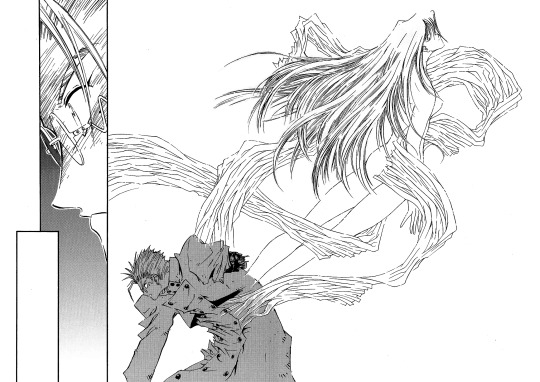
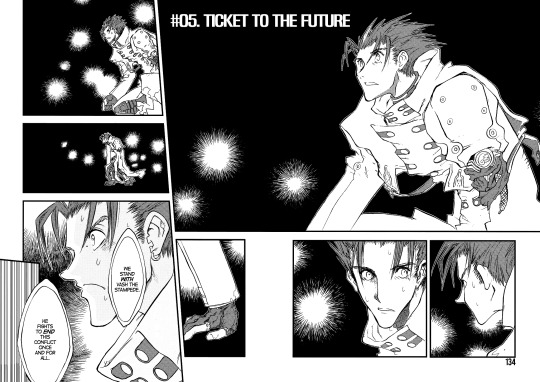
2. Cherubim: The Spirits of Harmony and Creation (Sisters)
• Element: Eternal Creation
• “Cherubim” signifies “The Fullness of Knowledge” or “The Outpouring of Wisdom,” embodying profound understanding and the ability to share divine illumination.
• In scripture, Cherubim guard the Garden of Eden, their composite forms blending animal features

• Referred to as the “Spirits of Harmony,” they are seen as the true creators of eternity, weaving the fabric of divine balance across the cosmos.
they are creating things and so protect humanity from its absolute doom
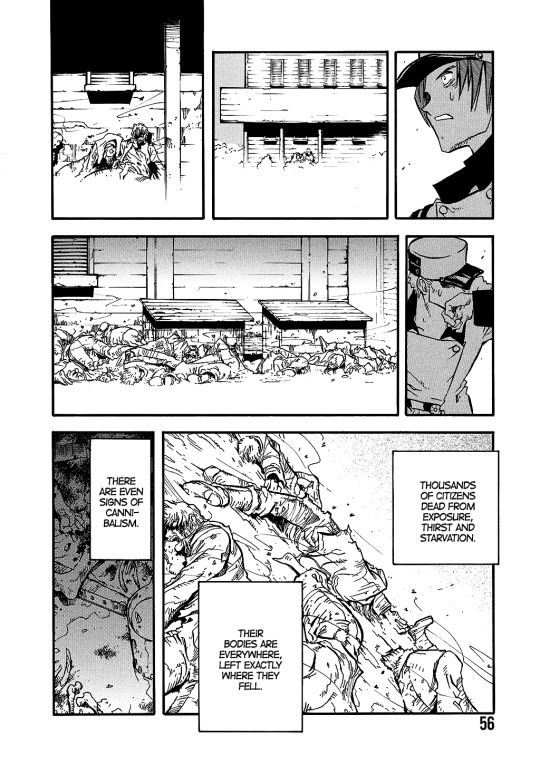
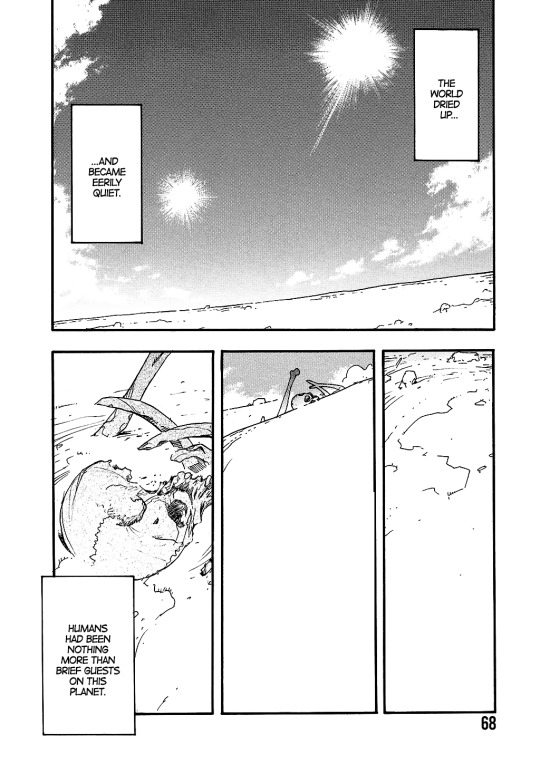
(What happens when they are taken away)
in the manga their powers actually cover a kind of illumination in form of the sharing of thoughts and memories with the humans in the end
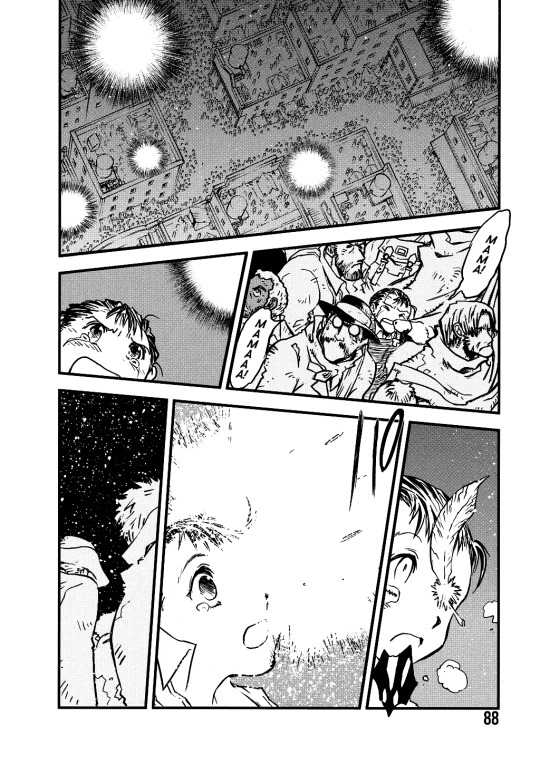
3. Thrones: The Spirits of Will and Divine Authority (Knives)
• Element: Air
• The Thrones embody ultimate authority, elevated above all that is lowly. They stand unwaveringly aligned with the divine will, receiving and channeling God’s presence with unparalleled reverence.
• Often associated with the Ophanim—the “Wheels” described in the apocryphal Book of Enoch and in the visions of Daniel and Ezekiel—they are the chariots of God’s throne, ever circling in celestial motion.
• Their essence is to be “God-bearers” (Theóphoroi), opening themselves fully to divine inspiration without the distractions of the material world
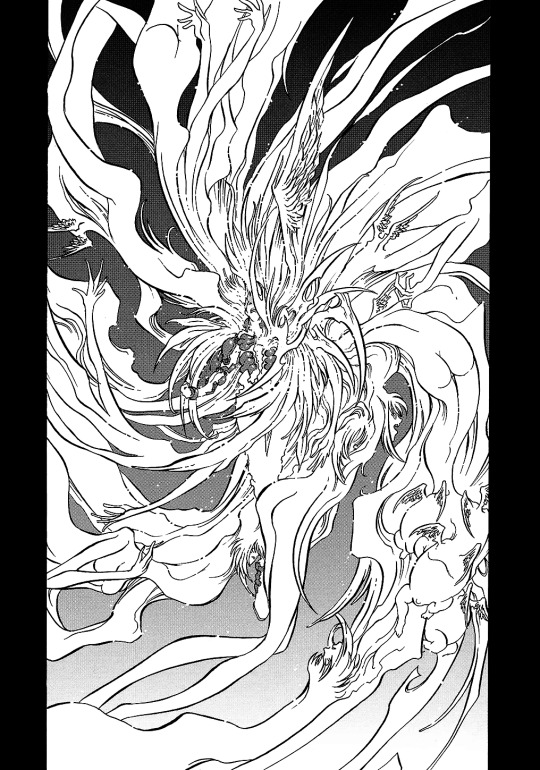
That would also very much fit with the way Knives is shown to direct the will of the collective as its ruler discarding what makes him human
also he is the wheel of apocalypse in the manga
he is also floating/flying in the air as a harbinger of destruction for 25% of the story lol
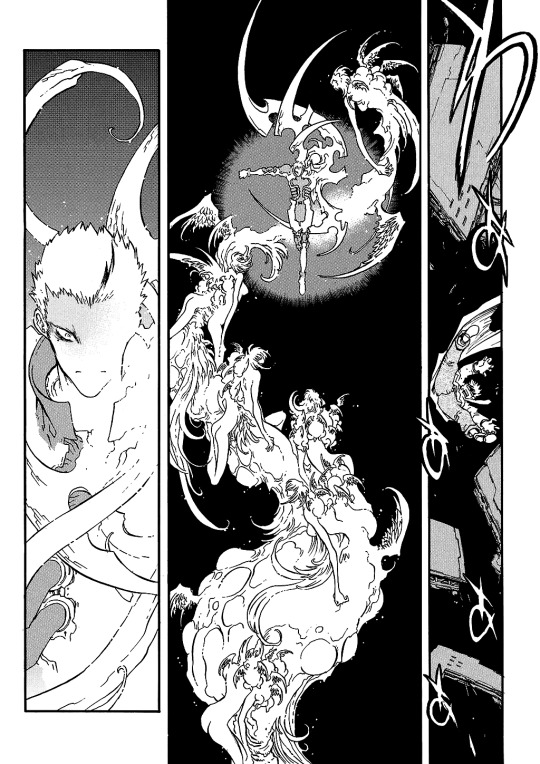
he's seeking harmony for his kind at all coasts
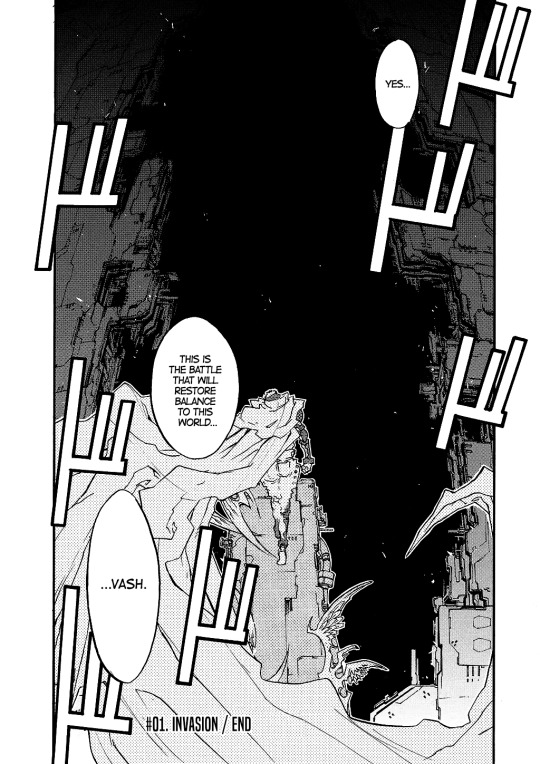
#I have never before researched so much about Christianity in my life all because of Trigun lol#trigun spoilers#trigun maximum#trigun#trigun analysis#trigun theory#crack theory
23 notes
·
View notes
Text
Trigun - Inspired by the movie "Wise blood"?
(maybe the book too but havent read it)
Anyways, first I thought it would just be funny to point out some surface visual references of charachters which prolly are too generic to be proof of anything.
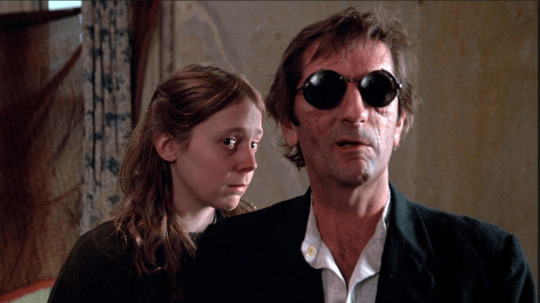

I mean ehh thats generic enough-
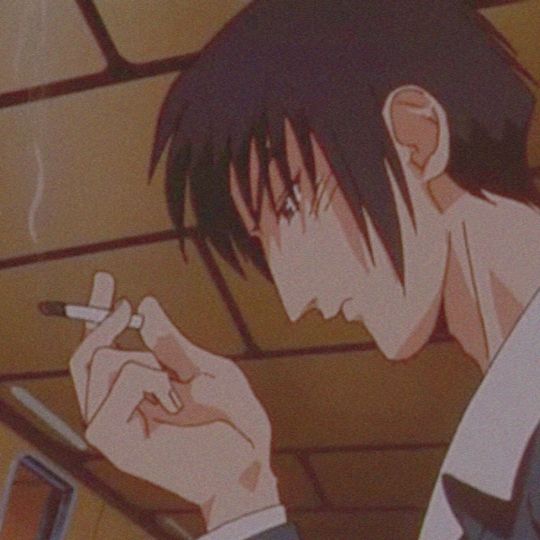
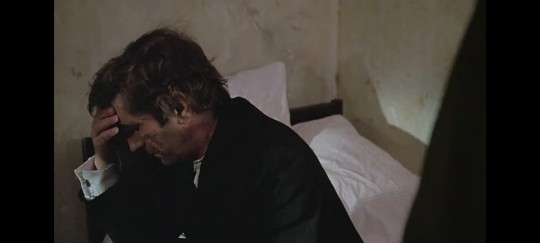
Well that too-
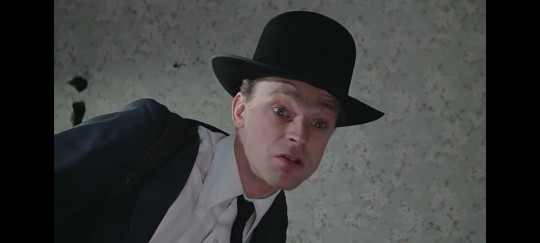

Well the hat and crazy eyes are there
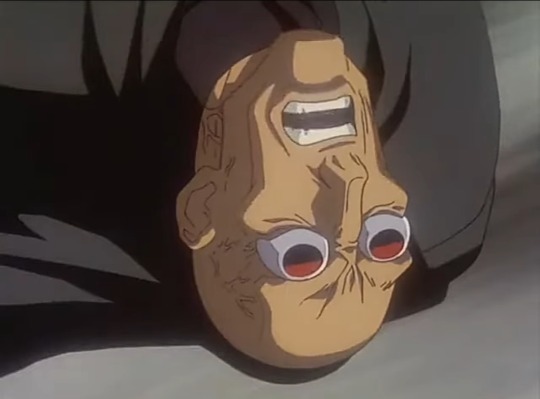

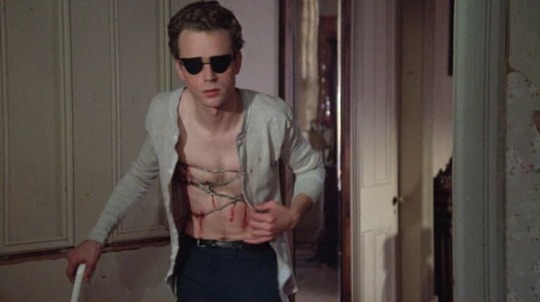
Well the last more recalls Vash's own injurys
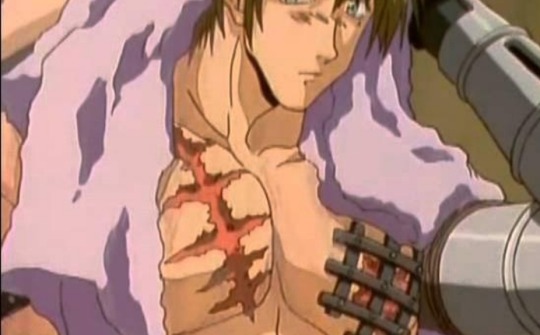
(think there is a scene in his Eriks disguise that match more)
But ok, one could say that this is as arbitrary as any other of my posts that dont deserve to be posted - Until I saw the full movie and got that there may be a deeper and more interessting connection
So trigun is know to have atleast Christian-adjasent themes and the author, even if never or not anymore Christian, seems to have a familiarity and interest with it that goes beyond the usuall japanese "wow cool crossess" and pop kabalah stuff (like NGE and shit or persona having all those occcult demon shit)
So what does it have to do with the movie? Well it is one exploring a theme that seems to be simmilar, even if Wise Blood presents it in a more macabre, black-humor, less sentimental and uplifting way
A world without God - or better said Christ/Love/Forgivness
Triguns whole point about Vash not killing anybody IS in the end an expression of the want of the world to be able to heal, to get better, to people to connect in a true way, of going beyond tricks and self serving rational scientfic interests
Thats why Knifes is kinda a representation of cold, uncarring survival of the fittest, of evolution, of the rule of superior beings by force and cold calculation and deception.
To make a parralel to the movie, it shows a man who cant see Christ, the power of redemption of something beyond himself and his own interests and striving - even if he feels justified by partly believing the things he rejects.
But in the end without them, it becomes a self fullfiling prophecy - his "Church without Christ" - without healing of the blind and resurection, without redemption - it condems him to that, making him blind and dead, and his atempts at repenting for killing some guy for a petty reason futile - not even being able to recupareta the love he gets from a landlady.
The theme of a fake preacher is then what is reflected in Wolfwood in Trigun, who is also just a killer, trained by another one, who can in the end find redemption in death and doing the right thing, even if it has a tragedy to it.
And in a way that illuminates Vash's whole journey more, why he couldnt give up and why it was important for him to find love and not become a more suffisticated monkey in a zoo who's hand only his brother would want to shake...
And thats why Vash not killing is actually cool and good and not stupid - cause of a random movie that butchered a book that prolly was tottally different.
But why the self.depreciation? Isnt apreciating the world and creation, "art", not a dialog, a call and response of unlikely meetings?
If not: Yeah...Sorry
#trigun#wise blood#wiseblood#christianity#analysis#comparison#thematic comparison#dialectical materialism#yeah...sorry#didnt read the book so sorry if that would make more sense#anyways interesting movie#for a moment you think its gonna be a corny oh bad people help each other movie but nah lol#also funny but also sad#and shows how many old gems there are I and most others havent seen#also yeah I wanna quit social media as I said but this was too interesting to not share even if I alone care lol#but trying again even if I fail after two days like allways lol pray for me post-ironically
11 notes
·
View notes
Text

Wolfwood's just a lost lamb of god's herd, or something, christian symbolism, and such...
(now i just sound like Wolfwood trying to do some last rites lmao)
#trigun#trigun stampede#trigun stampede episode 4#please toss any christian symbolism in trigun essays my way#i'm not well-read enough to fully extrapolate on the christian symbolism i notice in trigun#so would love to see some in-depth analysis!
19 notes
·
View notes
Text
I find it funny when ppl analyze trigun thru the lens of Christian mythos and iconography bc I literally just don't notice it. "This is like such and such guy from this book of the Bible where he did this thing and THAT is what this part is saying" like. Uhm. Plants really cool? WTF can Vash actually do? What are the characters actually thinking?
Aka my lens of analysis has so much more to do with what is factually there in the story rather than what it represents. Which says a lot about me actually I think
#speculation nation#like ppl who start talking philosophy terms and im like. what#i just dont care about that lol. either the christianity or the philosophy#like ykno it's cool to have the imagery but when it comes to actual like. stories and such???? nnaaaahhh#ive seen ppl wanting to read more christian stories to better analyze trigun and im just like. that just aint me.#like you do you. if it makes u happy go right ahead#but im much more interested in trying to figure out what plants (including vash) are capable of & how they work#and also character thoughts and motivation. that's a given as a fic writer tho lol#anytime i see any in depth christian lens analysis my eyes just glaze over lmao. cant help it. i just dont care about christianity.
7 notes
·
View notes
Text
I really love this analysis, though I am inclined to disagree with the last point. That being said, I may just be misunderstanding it so if anyone would like to offer clarification, I'm happy to listen
The way Im reading the scene, the wedding metaphor isn't subverted at all. The point of the Church as the Body of Christ is that all of it's members are Literally Alive in Christ, even after death. For martyrs in particular, the hallmark or completion of this "union" is their death.
Of course Vash may grieve for Wolfwood, but he isn't any less of a "heavenly bridegroom" figure here as far as I can tell for it. Moreover, it was by sticking to his highest principles (as outlined by vash) that wolfwood was able to find life after death, and remain bound to him forever - hence the wedding imagery. His death and his "marriage" are one and the same.
Just wanted to add my two cents, tho I may be restating the obvious. Ty op for the analysis!!
This is it; this is the Big 'Un that's been knocking around in my head since the bookclub's inception.
When it comes to mentions of the biblical parallels in Trigun, I've seen that Wolfwood is most frequently discussed as a Judas figure. I think it's important, though, to note that carrying out the Judas role to Vash's Jesus was a job he was ordered to take, and it's one he went through the motions of following while having the ulterior motive of killing the one who gave him the order in the first place. In fact, when Wolfwood does turn traitor, it's actually Knives and the GHG he chooses to betray. He ends up Judas-ing the guys who assigned him to the Judas mission - that's some sweet irony!
And as Wolfwood's time in the story draws to an end, he takes the path completely contrary to Judas' ignominious end by suicide. He instead takes a leap of faith and dares to place his trust in Vash's vision for humanity's future. His faith remains imperfect, but in the midst of all his doubt and uncertainty, he persists anyway.


This last stand of his becomes Wolfwood's ultimate affirmation of his devotion to Vash's ideals, and he effectively becomes a martyr, which places him far outside the image of Judas. In fact, I think that when we look back on his character arc as a whole, we can see how it more neatly lines up in trajectory with the story of another apostle: Peter.
Like Peter in the gospel narratives, Wolfwood finds it difficult to have the kind of faith that is asked of him. Vash goes into his battle with Rai Dei insisting to Wolfwood that he can finish the conflict without taking a life, but Wolfwood intervenes against Vash's wishes because he was worried about Rai Dei's next move. Peter sees Jesus walking on water and goes out to join him, but with the rough winds blowing around him, Peter becomes overwhelmed by fear and begins to sink. After these failures of faith in their respective stories, Peter and Wolfwood are then chastised by the men they follow.
Matthew 14:31 (NRSV) - Immediately Jesus reached out his hand and caught him. "You of little faith," he said, "why did you doubt?"
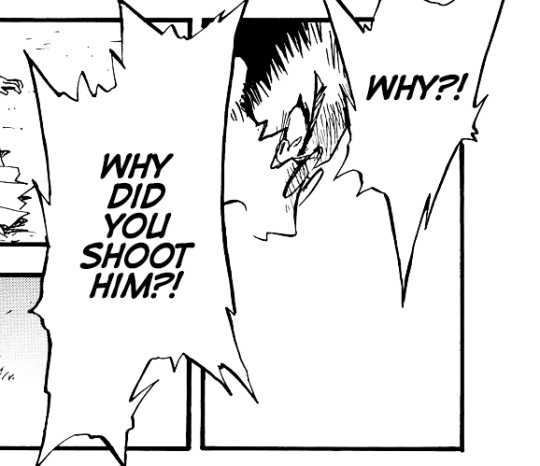

And it's these struggles with doubt, these moments of fear and cynicism overtaking faith that are so instrumental to the Christian perspective on salvation with its message of "You are flawed by nature, but you are loved beyond all comprehension nonetheless. Accept this love that it may save you and change you."
In Peter's case, although he is singled out multiple times for his failures (e.g. denying Jesus three times), he still holds a special place of prominence among Jesus' disciples. The 21st chapter of John features a conversation between Peter and the resurrected Jesus in which Peter affirms his love for Jesus three times (a reversal of the three times he denied Jesus), and Jesus responds by instructing Peter to care for his flock. After Jesus ascends to Heaven, Peter continues the work set out for him in building the early church until his eventual martyrdom, which, according to church tradition, occurs via upside-down crucifixion (see Caravaggio's rendition here). Interestingly, Wolfwood's martyrdom also involves lots of grievous bodily harm being dealt by crosses.

So the saint gets brought to death's doorstep, and that brings us to the infamous whiskey bottle

Others have already pointed out that "The Bride" likely refers to the Bride of Christ. This excerpt from the Catechism of the Catholic Church sums up the concept:
The unity of Christ and the Church, head and members of one Body, also implies the distinction of the two within a personal relationship. This aspect is often expressed by the image of bridegroom and bride. The theme of Christ as Bridegroom of the Church was prepared for by the prophets and announced by John the Baptist. The Lord referred to himself as the "bridegroom." The Apostle speaks of the whole Church and of each of the faithful, members of his Body, as a bride "betrothed" to Christ the Lord so as to become but one spirit with him. The Church is the spotless bride of the spotless Lamb.
Now Peter is of particular importance when talking about the Church as an institution, because in the Catholic tradition, Peter is believed to have been granted a distinguished position of authority as the very foundation of Jesus' church, and every Pope is considered a successor to Peter in their occupation of the Church's highest office.
So Peter = Pope = the head of the Bride of Christ. And if we take the reading of Wolfwood as a Peter analogue.... you see where we're going. The Bride of Christ has been sanctified through a powerful demonstration of sacrificial love and prepared for the wedding to the bridegroom, but right here Yasuhiro Nightow subverts the biblical metaphor to devastating effect. The wedding doesn't come to fruition, because Vash can't bring himself to step into the role of the heavenly bridegroom. In this moment, he just feels all too painfully human in his grief. Wolfwood ascends - celebrated across the sky by those he saved with his selfless love, but Vash descends - acting as an ordinary person mourning the loss of a loved one.

John 13:36 (NRSV) - Simon Peter said to him, “Lord, where are you going?” Jesus answered, “Where I am going, you cannot follow me now...."
#trigun#Trimax#trigun maximum#trimax spoilers#trigun maximum spoilers#Analysis#character analysis#thematic analysis#Meta#Long post#Vash#vash the stampede#Wolfwood#nicholas d. wolfwood#nicholas d wolfwood#Christianity
314 notes
·
View notes
Text
Absolutly unhinged discussion my girlfriend and I had last night after reading this analysis post by @huginsmemory about trigun and Christianity








#trigun#trigun maximum#trigun stampede#vashwood#vash x wolfwood#vash the stampede#nicholas d. wolfwood#nicholas d wolfwood#gets very blasphemous very quickly
120 notes
·
View notes
Note
Hello! I hope your day has been well. Sorry for the sudden message out of the blue. I really enjoyed reading your Trigun analysis posts from last year - you shed some valuable light on the Christian symbolism in the story and your character analysis is always on point. They've taught me a lot!
Now this might be a strange-sounding ask, and I hope it doesn't bring you discomfort, but - would you be alright if I printed some of your analysis posts strictly for personal reference? If there's one thing the internet has taught me, it's that nothing digital lasts… and I truly did enjoy reading your analyses, so I was wondering if it would be alright to save a copy of them.
Of course, I don't want to do anything without your permission, thus my reaching out. I would only be printing a single copy for myself with credit to you as the author, and I would not recirculate the copy publicly. If you're not comfortable with this idea then I completely understand. Apologies again for the weird ask, and thank you very much for your time!
Alsjdkakdksk, that's incredibly flattering that you enjoyed my analysis to the point you would like to print them out; no discomfort from the ask at all, just flabbergasted and overwhelming excited that you would like to keep them use them as a personal reference! 🥺💕 So definitely feel free to print them out, and as youre clearly aware of etiquette around printing out this kind of material, I have no worries about you printing them :)
Also, I don't think it's a weird ask at all either, with the ease things can be deleted or lost; after all I do fanfiction bookbinding in my spare time to archive fics I like myself, haha. It's also a good reminder to myself to actually get around to copying them over to AO3 so they have an extra platform to be hosted on if something occurs to Tumblr anyhow... I hope your day also is going well, and thanks again for the compliment!

3 notes
·
View notes
Note
❌, 🌱 , 🔮

@knaivcs | Prompts I'd Like to Recive: Headcanons
-
❌ ] is there something your muse struggles with that they might never overcome? what is it? why do they have so much trouble with it?
It's hard to pin down the exact words because its a big cocktail of things that all bleed into eachother. His self worth, guilt, the desire to stick to the morals he's chosen, they all blend together and just make life a Struggle:tm:
I think if I had to narrow it down for this ask...the guilt. It's almost entirely self-imposed but he carries it none the less. Guilt for every life he fails to save or protect, taking every confrontation on his own shoulders because this or that town only ended up in trouble becuase he was there.
And he struggles so much with it because even if its something that can;t be helped, even if the blame more logically should be put on the people chasing after him, rather than his own sheer existance, he can't bring himself to see it that way.
All he knows is that danger and trouble follow him, people get involved, get hurt, and the easiest way to avoid that is not to let people near him.
So clearly, if he's the catalyst, it's all his fault, right?
🌱 ] what themes are relevant to your muse?
Oh man the amount of meta-analysis posts ive seen abt this subject on twitter.
Personally I think...I wanna narrow it down to/focus on the themes of...like...morality, choice, finding good in hopelessness, because those are what I personally see and enjoy most in Vash. There's so many, in the whole show, manga, just every medium of Trigun as a whole let alone what Vash represents, but for me?
Yeah, I think the theme of choices and morality, and moral choices, is a big one that I like to think abotu and play around with. Becuase Vash isn't 100% good and kind by sheer nature, he activly makes the choice to be how he is.
Sure it's made a little easier maybe by the fact he's an absolute sweetheart, but he's not incapable of violence. Of negitive emotions, fear and anger, lashing out. He just has a tight reign on it and choses not to. He choses to smile and let it all roll off his shoulders. Choses to be kind in the face of unending cruelty.
He chose his moral path, and sometimes he has to fight so viciously to hold onto it. He fights tooth and nail almost constantly to cling to the good in humanity, when the whole plant seems to be doing it's best to try and prove him wrong.
And that's just. Really fun and interesting to me.
🔮 ] what is your muse’s relationship with religion and spirituality? were they raised in a certain religion? have they stuck with the same set of spiritual beliefs all their life, or have they changed over time? are they settled in their spirituality now?
Just from the sheer fact that Trigun exists half way over the edge of the "being bible fanfic" cliff I wanna say he's been exposed to a decent level of christianity, but personally lands somewhere between "beleives but doesn't practice any faith" and "if god exists he hates me"
Okay but in all seriousness. Vash I think....he doesn't hate the idea of a higher being, and he's ABSOLUTELY never going to be the type of dismiss or look down on another persons religion, but he's just kind of...in a religious limbo, I guess.
I feel like, espcially after meeting Wolfwood (if we take as an example, a Wolfwood who is more religious...if dubiously)Vash has maybe sat down once or twice and tried to pray, if he's felt desperate enough, curious enough. He probbaly asked WW to teach him more about religion, too, since he probbaly got a barebones education thus far if that.
He's definitly not a practicing christian/catholic, doesn;t activly seek out god or let religion influence his life and decisions. But he can understand and even sometimes feel for himself the comofrt those kinds of people get from having a figure like God to take comfort or look for help in.
2 notes
·
View notes
Text
If the Buddhists and Christians join forces we might one day achieve the ultimate trigun analysis post
0 notes
Text
SUPERVERISVE: “Trigun” is indeed probably the most Christian anime ever
I really didn’t know what to expect with “Trigun”.
Everybody had been recommending it to me for awhile, but I had tried the first couple of episodes already. They weren’t bad, but the show never really clicked for me. I was left there scratching my head wondering what was supposedly so special about it. I got why somebody might enjoy it in a “It’s not that great but it’s amusing” sort of way, but no more than that.
And then to be told that at its heart it was a Catholic story philosophically, thematically, and morally?
It should have been right up my alley, but I didn’t see the path from point A to point B. Still, so many people were praising it, and it had been recommended to me so many times, that I felt obligated to finish the series out. It’s not as if it was painfully bad or anything, and there must be SOMETHING to all the talk, right?
So I kept watching.
And man am I glad I did.
“Trigun” is an excellent show.
“Trigun” is the story of Vash the Stampede as told by insurance girls Meryl and Millie. Vash is a mysterious yet highly destructive drifter from the western-style planet of Gunsmoke, and Meryl and Millie have been tasked with following him around because every time he shows his face it costs their company enormous amounts of money. Vash has a 60 billion double dollar bounty on his head, but there’s something strange about him:
He’s a really, really great guy. Funny, fun, great with children, defender of the weak and helpless, and abhorrent of all killing of any kind.
So what’s with the bounty? And what’s with Vash?
And there’s your story.
“Trigun” starts off as light as a feather, even goofy, and then gets…dark. Really, really dark. Bloody deaths of beloved characters type dark.
“Trigun” is a show that is great at little, bad at some (the animation is rather weak, though I find much criticism of the dub to be unwarranted), but good at almost everything, and by the time it all ends the whole feels much greater than the sum of its parts. One thing the show is particularly good at is making you empathize with everyone, even the bit characters – nobody is acting like a jerk just to act like a jerk. If you have a giant wall up guarded by gunmen to keep out outsiders, you probably have a good reason for it and don’t just hate orphans. And if you want to kill Vash the Stampede, well, join the club.
“Trigun” is also uncompromisingly brutal when it comes to exploring its themes. Vash has taken the philosophy of “Thou shalt not kill” to the extreme, refusing to do so even in self-defense or defense of others, at least at the point of the series’ start. And we love Vash for it!
But it’s not so black and white. How many lives would Vash have saved if he’d just killed Knives? Hundreds? Thousands? And what if it really does come to protecting innocents, in that moment? Should you STILL not kill? Why not? And what does it mean for you if you do?
“Trigun” asks these questions without flinching, putting the matter before you as starkly as possible. And we never really get straight answers.
“Trigun’s” characters are rather unmemorable as a whole, with a few notable exceptions. Legato is one of the most chillingly horrifying villains I’ve ever seen, Vash himself gets a lot of rich character development, and, of course, preacher man Nicholas D. Wolfwood, the man with the most badass Cross on the planet, is the most awesome character in the whole damn show.
The man. The myth. The legend. Nicholas D. Wolfwood
Let’s talk a little more about Wolfwood, who is a fascinating character. It is interesting that Vash, “The humanoid typhoon” who doesn’t really talk about God or religion all that much, is the absolute pacifist of the group, while Wolfwood, the Priest, provides the counterargument. Wolfwood believes in a rougher world than Vash and in some ways comes from a rougher world than Vash, so he finds Vash’s no-kill policy naive, frustrating, and insulting, implying that men like him who kill to protect themselves or others are just as bad as cold-blooded murderers. It’s a legitimate grief, and the show portrays it that way. Like the best fiction neither side is shown as being exactly “right” or “wrong”. Instead, the idea is explored and examined in an intelligent and even-handed way.
There’s so much more to say about Wolfwood, who is truly a fantastic and fantastically written character, but to go deeply into what makes him so great would be to get into some really annoying spoilers, so instead I’ll leave this fantastic article out there for all of you to read when you finish the series.
The final episode – at least the second half, when the useless clip section of the episode is over – features one of the most outstanding gunfights I’ve ever seen on screen, almost completely dialogue free and brilliantly filmed. And the ending?
Well…
When I first saw it I’ll just say I was REALLY, REALLY ANGRY, though my brother pointed out some small details about the scene that helped me look at it in a new light. Still, it’s fair to say that it makes you think and stays with you a long time after it’s over.
Worth noting: “Trigun” features one of the most beautifully shot and filmed death scenes I have ever seen, and one of the saddest. I won’t say who it is who dies, but the scene is so well-done I feel that it is worth calling out specifically as being perhaps the best scene of the entire show. I don’t think I’ll need to link it – you’ll all know what I mean.
“Trigun” isn’t a masterpiece on the level of “Fullmetal Alchemist: Brotherhood”, “Cowboy Bebop”, or the first half of “Death Note”. It never reaches the insanely high heights of any of those shows. Yet it’s never truly bad, even during its slow start, and it evolves into something that feels unique despite the fact that the sci-fi western is essentially its own sub-genre, with shows as brilliant as “Cowboy Bebop”, “Firefly”, and “Outlaw Star” (so I’ve been told, anyway) all fitting into that niche. Its uncompromising and unflinching nature gives it a fresh perspective on a lot of well-worn themes, and its take on Christianity feels both sympathetic yet somehow alien – like it’s being investigated by an outsider and all of its potential weaknesses are being shaken out and examined. When everything in the show’s DNA all clicks together the result is excellent comedy and compelling, and sometimes devastating, drama. While I don’t think it’s up with the top tier of shows, if somebody were to tell me it was their favorite I could definitely understand that.
Is it superversive?: Yes, fascinatingly so
Overall score: 8 of 10. Well worth your time.
(A note – after googling around while writing this article I’ve found that there is a TON of excellent “Trigun” analysis out there to read – it really is a much deeper series than you might give it credit for at first glance. Many of these essays are fascinating, and it might be worth your time just to google something like “Trigun Christianity” and look at some of them if you’re that type of guy!)
SUPERVERISVE: “Trigun” is indeed probably the most Christian anime ever published first on https://medium.com/@ReloadedPCGames
4 notes
·
View notes
Text
Trigun and the 'Bride of Christ'

An additional thought that popped up after my previous post about Triguns heavy themes of Christianity (a somewhat? Part 2?). In this I look at the Vash and Wolfwoods relationship, their opposing views and how that relates to the Christian term 'the bride of christ'. During this I specifically discuss a large spoiler for the series/manga, so readers beware!
I was chatting with some lovely folks on the Vashwood discord server (if you wish to join, click this link!) about Wolfwoods death, and the way it's, well, wedding themed. The wedding themes include the confetti, the way Wolfwoods passing occurs in front of a church, the ringing of the church bell, and the bottle of liquor they share is labelled 'BRIDE' with a cross on it.
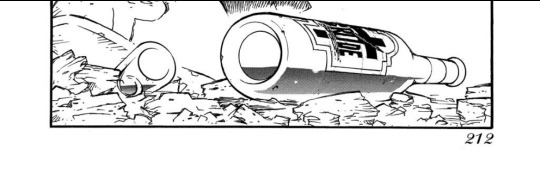
All the items come together in a definite way that resembles, in some terrible fashion, the festivities for a wedding. Hell, even after Vash buries Wolfwood, he makes tons of dishes of food, and Livio and him basically have a feast, another thing one does at weddings.
The 'Bride of Christ'
What particularly caught my eye was the bottle with the word bride on it, with a cross. Multiple times within the new testament, the body of the church is referred to as the 'Bride of Christ'. As I've previously mentioned, Vash is regularly set up as a Christ-like figure; his actions and his philosophical values align with a Christian perspective, in his belief in unconditional love and forgiveness (ie, the blank ticket). As well, as that Wolfwood is a Christian preist, this literally makes him a 'bride of Christ'. In a sense, where in the story Vash is pitched as a Christ-like figure, this means that Wolfwood could be interpreted as the 'bride of Vash'. This especially so considering the contextual clues that hint towards a wedding - confetti, church, and church bells.
Acceptance of Christian philosophy
Further adding to this, is that although Wolfwood was a priest, he did not fully ascribe to Vash's view. In fact, the two of them are foils, their beliefs similar- both coming from love and a need to protect, but differing in Vash ascribing to unconditional love and forgiveness, while Wolfwood refuting that such a position can be practically taken (this is, well, I would say a simplified take on their beliefs but thats a different post for a different day). However, by this point in the story, the both of them have very deeply impacted each other. In fact, this is set almost immediately after Wolfwood saves Vash from Knives, which is the the moment where Vash openly forgives Wolfwood and Wolfwood begins his acceptance of Vash's philosophical views; in that specific moment, he accepts his own absolution (explained further in my previous post).
It is exactly in Wolfwoods fight against Chapel and Livio, that Wolfwood fully (or mostly so) accepts Vash's philosophical views, expanding to accept a blank ticket/unconditional love for others. This is seen as he repeatedly chooses not to kill Chapel's hired guns, and even sharply pleading Livio to spare one of them. Indeed, previously at Vash's request, he'll shoot to injure, but he's not really shown to be particularly worried about the bandits, versus here he is actively choosing to minimize harm; exactly like we've seen Vash do, over and over and over again throughout the series. As well, the hired guns literally try to target the orphanage when they've clearly lost, and also kill one of their own when Wolfwood brings him back, telling him that they've just upped their pay- showing that they're not particularly 'redeemable' hired guns that are likely to repent and become good people. And yet, Wolfwood still chooses to try and save them.
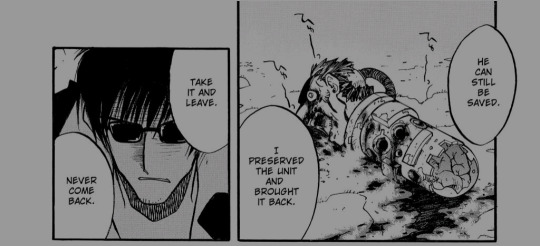
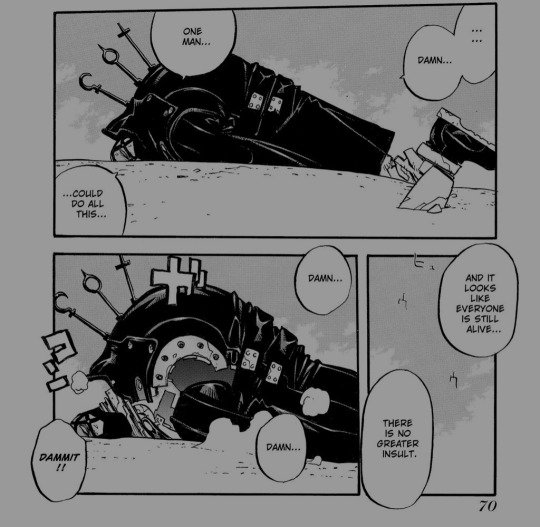
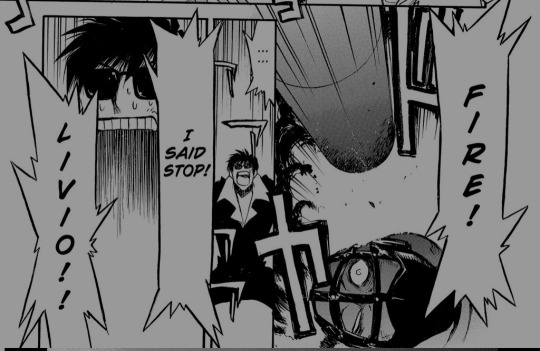
He also specifically goes out of his way to not kill Livio, even though killing Livio would severely even out the playing field, and Wolfwood would likely not have likely died as a result. And Wolfwood makes that decision, again and again and again, only focusing on killing Chapel, and Chapel only, since he's the one that is threatening the orphans.

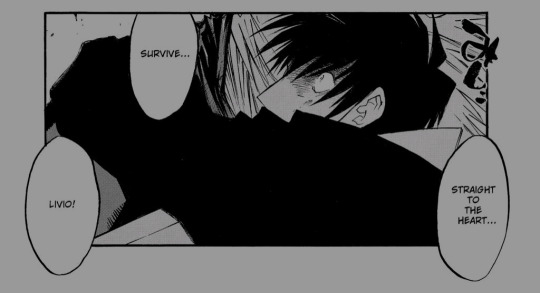
While Wolfwood fights, Chapel derides him on Vash's views, and how Wolfwood has picked them up. Wolfwood, close to death, reviews his relationship with Vash and Vash's philosophy, and refutes the ideology that Chapel believes in, and that he himself has lived under, that they need to kill to survive, (or to save lives) and that Vash's belief in forgiveness and unconditional love is foolish.
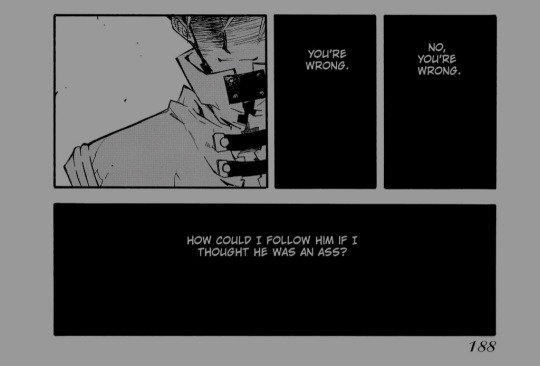

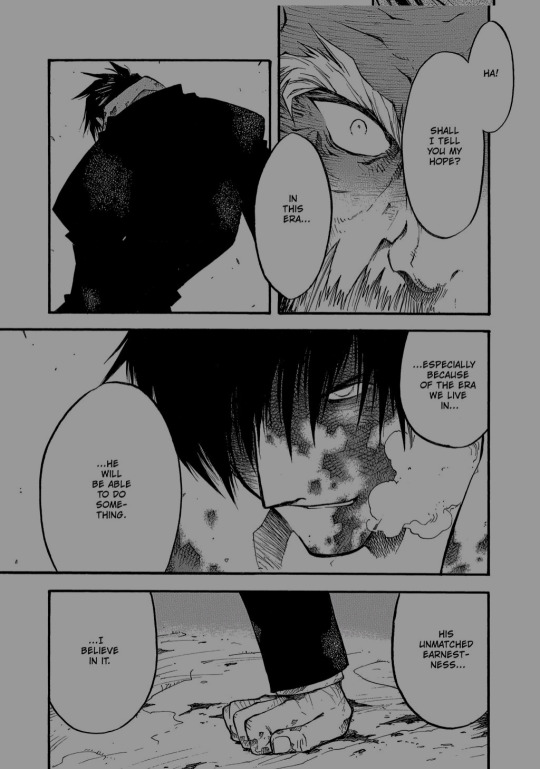
It culminates in Wolfwood declaring that he believes in Vash, in his principles, and standing back up to continue to fight, having accepted Vash's Christian philosophy. Interestingly, it's also Christian leaning terminology he uses; both in that he followed Vash, much like one follows the the teachings of Christ, and that he believes in the Vash's ability to change to world with his philosophy, in the same way Christians believe in Jesus's ability to save the world through the gospel.
In summary, Wolfwood chooses to accept and even says he believes in Vash's philosophical views, thereby choosing to accept the possibility of forgiveness and unconditional love, both for himself, as is shown when he saves Vash from Knives, but also for others, and especially with Livio during the scene up to his death. This full acceptance and belief in a Christian/Vash's perspective would then also show that Wolfwood has fully accepted to be the 'bride of Christ', making him not only via contextual cues a 'bride' of Vash, but also within a Christian theological sense a bride of Vash as well.
In conclusion, (ie, TLDR) Wolfwoods death is wedding themed, with confetti, a church, church bells, and a bottle with the label BRIDE with a cross on it. The church is within the Bible called the 'bride of Christ'; as Vash is a christ-figure, and Wolfwood is a priest, this would make Wolfwood Vash's bride. As well, it is just previous to Wolfwood death scene that Wolfwood has accepted Vash's Christian philosophies, signalling his acceptance as the 'bride of Christ/Vash', further perpetuating the wedding theme.
TTLDR: Vash and Wolfwood are married yup 👍
#trigun#trigun manga#trigun maximum#wolfwood#nicholas d. wolfwood#trigun wolfwood#vash the stampede#livio the double fang#trigun analysis#manga spoilers#vashwood#vash x wolfwood#back at it again with trigun analysis...#dude I have like two midterms in a day and here i am. writting about my silly little blorbos#trigun... christian... analysis...#i need to do a post on their philosophical differences because thats a whole fucking bag of cats thats fascinating#is this blasphemous? i feel like it might be a bit. i feel like jesus would be like no no u r right and have a good point#while the church would be like *two shots to the back of my head*#anyways real talk tho my whole reason of writing this is to get people to redo really dramatic christian paintings as vashwood#i feel like some of it might be a bit of a strwtch and then i see then damn bottle again and im like. fuck. nightow u fucker#i feel like he didn't mean it in a gay way but whooo-y baby im gonna take it in a gay way#also whats really interesting is wolfwood in a way worshipping vash a bit and being still unable to see himself as worthy#also lots from wolfwoods pov but its also interesting Vash's own relationship with himself since its a lot of selfhate and negation#anyways! random thoughts#hugin rambles
410 notes
·
View notes
Text
Welcome to my (generally) shit posting blog. For tagging:
Own posts: hugin rambles/speaks
Asks: hugin answers
Own art: hugin scribbles, hugin sculpts
Own fanbinding: roseserpentpress
Own posts specific to fandom tags:
Gravity falls: hugin rambles gf
One piece: hugin rambles op
Other accounts include:
Bindery blog -> @roseserpentpress
Art blog -> @blae-kitta
Compilation of all my posts blog (archive) -> @hugins-cabinet-of-curios
Meta-post AO3 pseud: sigh_of_the_primordial_mouth
Fanfiction AO3: H_bivittatus
Also, inbox and DM's are always open for discussing any of the fandoms I'm in :)
Donations for Palestine master post
More donations for palestine
Gazafunds
Scammers using Palestine master post
Sudan: medical donations , donations post, website of vetted fundraisers , SAPA, sudanfunds
Meta analysis post links:
Trigun 🪽
Meta
Trigun and Christianity
Trigun and the Bride of Christ
First Meetings: Wolfwood and Vash
Wolfwood, the Symbolism of the Punisher and Tragic Narratives
Wolfwood and Vash Characterizations in Tristamp vs Trimax, and how it relates to Femininity and Yaoi Tropes (opinion piece)
Eye of Micheal and the Zia Sun symbol (informational post)
Fanfiction:
blackbird (vashwood, M, 5.5k)
I'm no pale faced saint (vashwood, E, 11k)
One piece: 🏴☠️🌻
Plot Foils: On Ace, Robin, Marineford and Enies Lobby
Gravity falls: 🌲
Meta
On ad astra per aspera
Gravity Falls and Exceptionalism
Ford's Dreams: Attraction and Asexuality
Ford and Fiddlefords creations and parallels
Bill musings: what we don't know, failure to tell the truth, on denial and manipulation
And many more smaller ones in the hugin rambles gf tag
Fanfiction:
Family Lepidoptera Suborder Heterocera (Billford, 12k, M)
#hugin rambles#hugin speaks#bro literally i can make a post and then im like. well nvm i can't find it like. a week later#its gone into the void. no returns#gone forever
83 notes
·
View notes